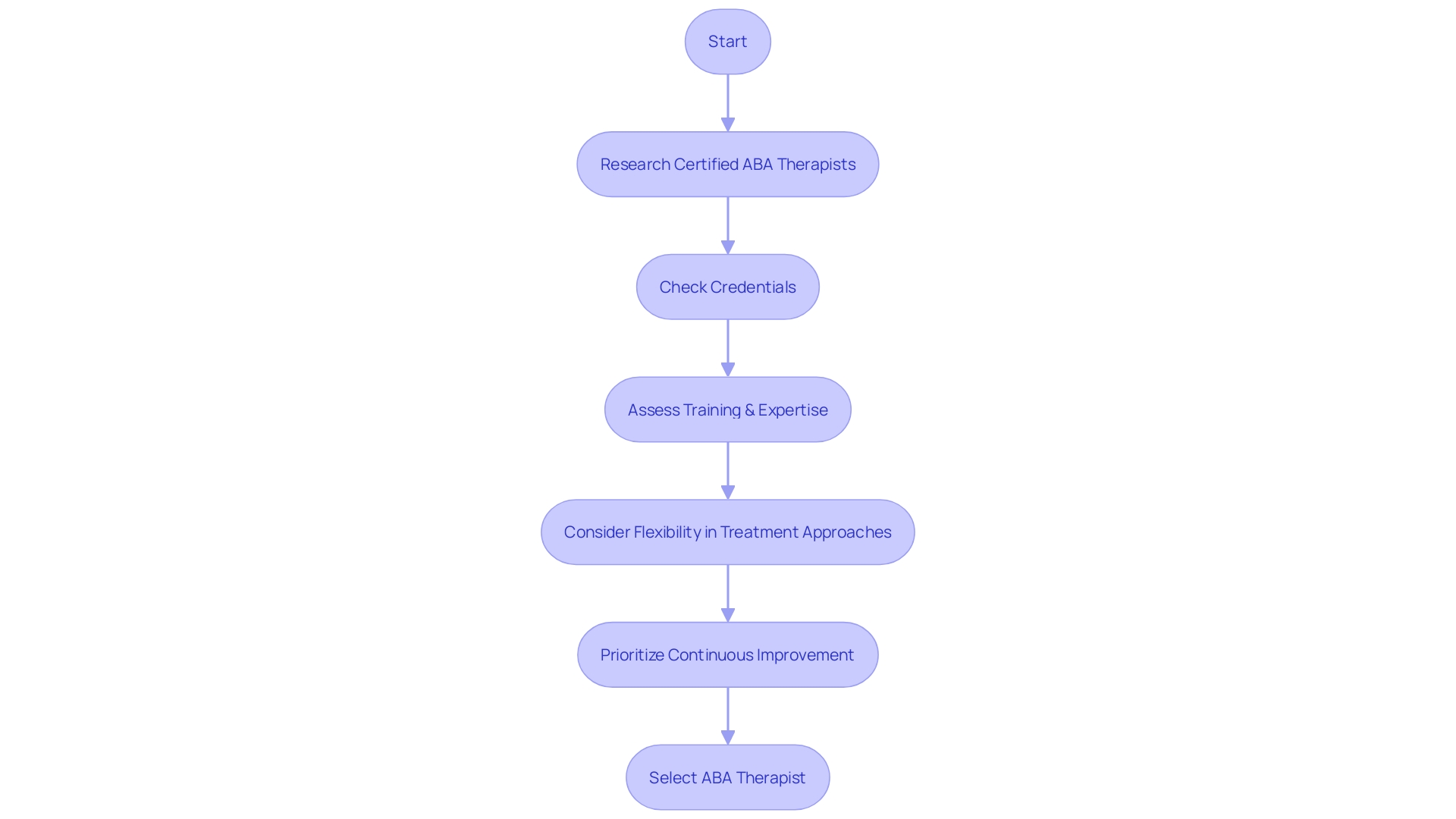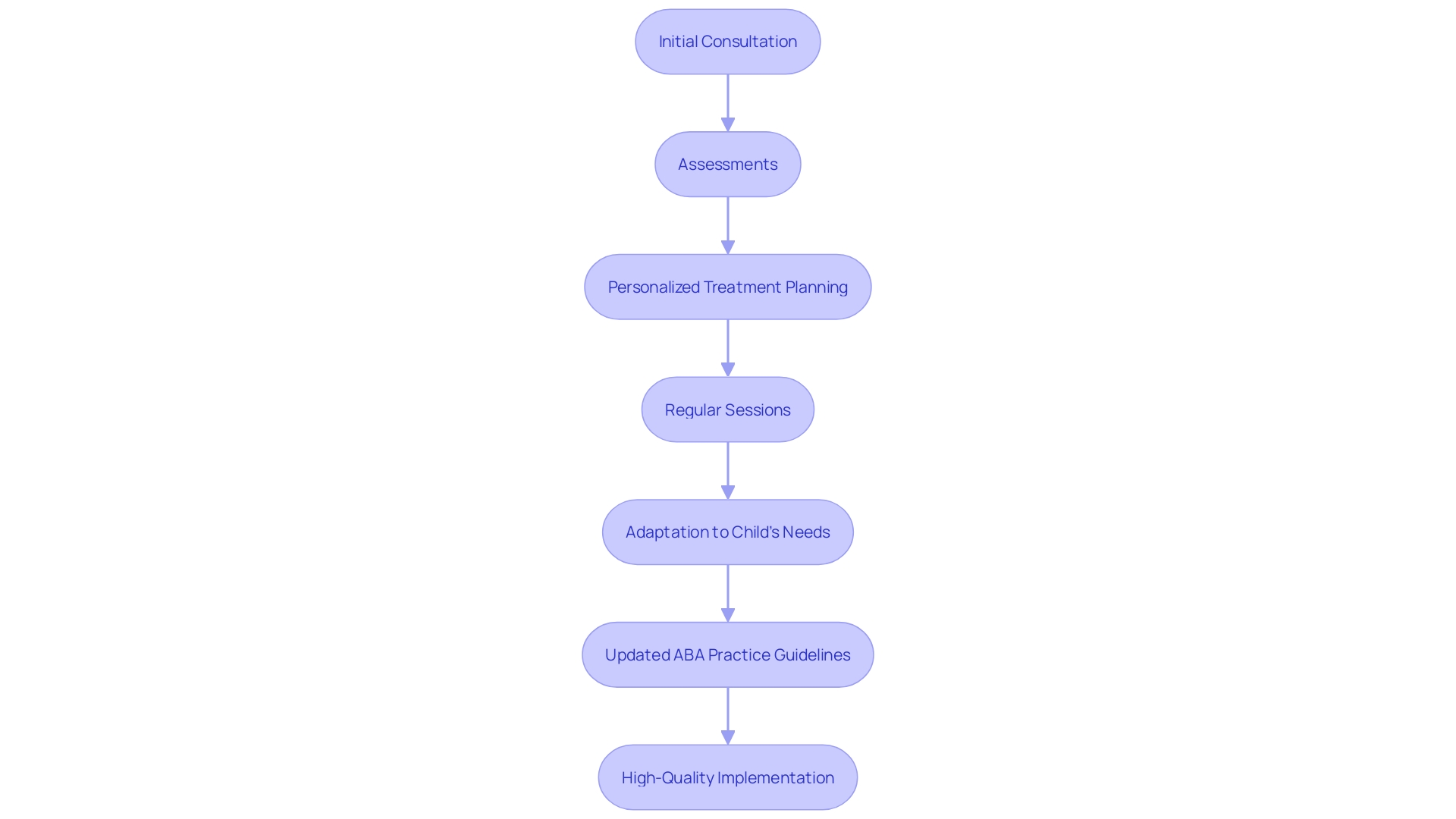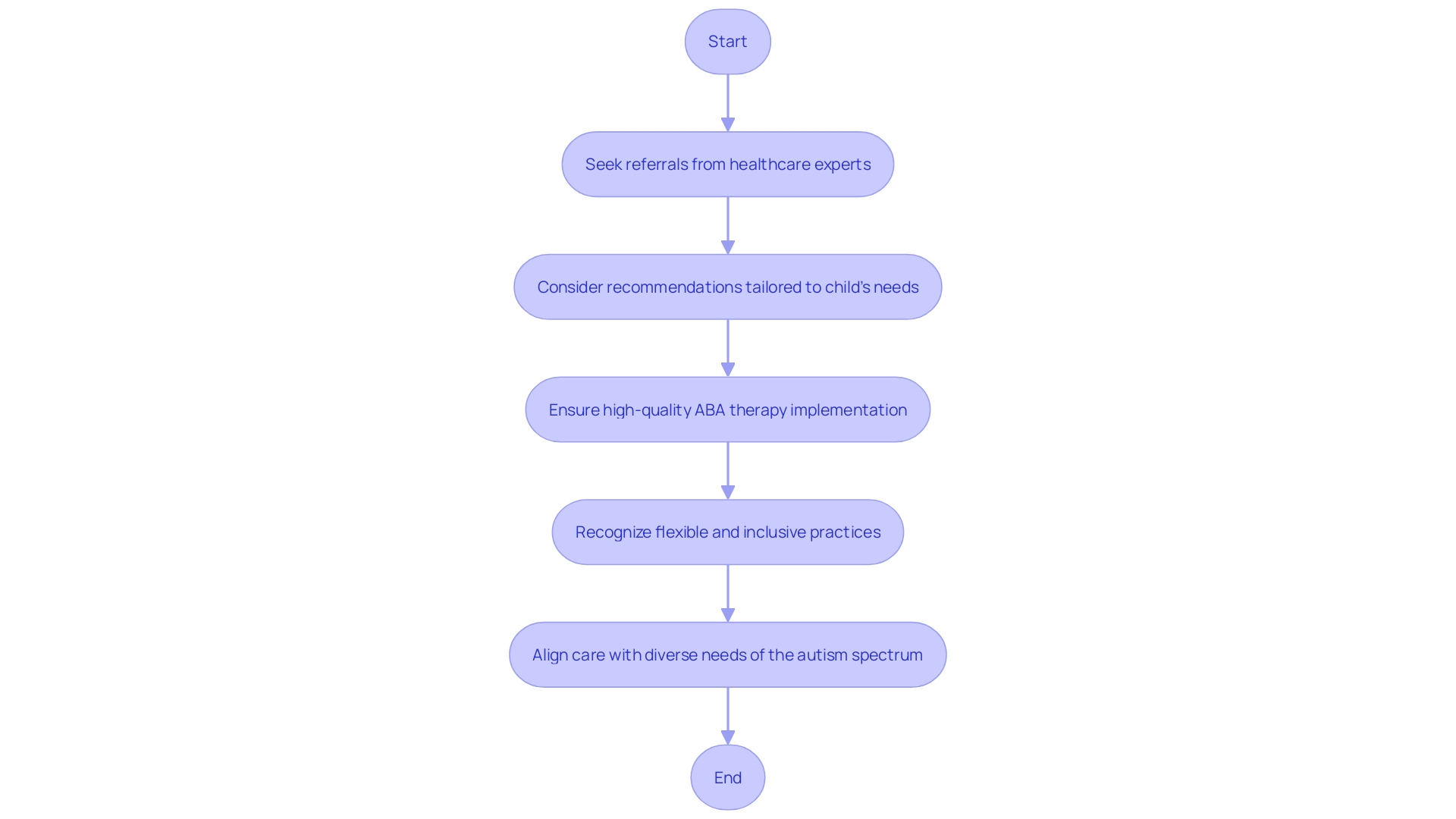Introduction
Selecting the right ABA therapist for your child with developmental challenges is crucial for their well-being and progress. It's important to find a certified ABA therapist who has completed extensive training, met rigorous professional standards, and possesses the expertise to implement ABA therapy effectively. A foundational assessment by a Board Certified Behavior Analyst (BCBA) is essential to set specific, measurable goals for your child.
The treatment should be adaptable to meet diverse needs and schedules, enhancing support for both the child and their family. Recent advancements in the field, such as the updated ABA Practice Guidelines, highlight the importance of high-quality treatment standards. With industry leaders recognizing the value of flexibility, there are innovative work models that attract top talent and better meet the needs of therapists and clients.
When searching for the right therapist, prioritize those with the credentials and a commitment to continuous improvement, ensuring your child receives the best possible intervention.
Importance of Finding Certified ABA Providers
Selecting a certified ABA therapist is paramount when striving to provide outstanding care for children with developmental challenges. Certification signifies that a therapist has completed extensive training and met rigorous professional standards, equipping them with the expertise to implement ABA therapy effectively. This proficiency is especially crucial when addressing behaviors that may be harmful or highly stressful for the child and caregivers. A foundational assessment by a Board Certified Behavior Analyst (BCBA) is essential to set specific, measurable goals for the child. The treatment should be adaptable, as families have diverse needs and schedules, and a flexible approach can significantly enhance support for both the child and their family. Recent advancements, like the updated ABA Practice Guidelines by the Council of Autism Service Providers, underscore the importance of high-quality treatment standards. Encouragingly, industry leaders are also recognizing the value of flexibility, with innovative work models that attract top talent and better meet the needs of therapists and clients. This evolution in the field is reflected in the increased funding and strategic initiatives aimed at sustainability and improved care outcomes. When embarking on the journey to find the right therapist, parents should prioritize those with the credentials and a commitment to continuous improvement, ensuring their child receives the best possible intervention.

Qualifications and Certifications to Look For
Selecting the right ABA therapist involves more than just verifying credentials; it's about understanding the nuances of their expertise and how it aligns with the individual needs of your child. A Board Certified Behavior Analyst (BCBA) is certainly a mark of someone who is committed to delivering high-quality therapy, having completed rigorous training and education. It's a reassuring sign of their dedication to their professional development and their ability to provide evidence-based therapy.
Yet, it's essential to recognize that ABA therapy is not a one-size-fits-all approach. The expanding spectrum of autism, as noted by Dr. Jan Blacher, highlights the importance of personalizing therapy to meet the diverse needs of individuals. A therapist's ability to adapt their methods to the strengths and challenges of each child can significantly impact the effectiveness of the treatment.
Moreover, with the recent release of updated guidelines by the Council of Autism Service Providers, the ABA field is moving towards more standardized care, ensuring that practitioners are equipped to implement ABA therapy at the highest quality. This evolution in the industry standards underscores the importance of selecting therapists who not only hold the right qualifications but are also abreast of the latest best practices and ethical considerations.
In your search for a therapist, consider their familiarity with different therapeutic models and their experience in tailoring interventions. As the prevalence of autism continues to rise, it's crucial for therapists to possess a broad understanding of applied behavioral science and to be capable of addressing the unique requirements of each individual with autism. A multidimensional approach to therapy, backed by a solid educational foundation and adherence to current guidelines, will serve as a strong foundation for supporting your child's growth and learning.
Experience and Expertise of the Therapist
Selecting the right ABA therapist for your child involves more than just verifying credentials; it's about finding someone who can connect with your child and address their unique challenges. Seek out professionals who not only have experience with ABA therapy but also have a history of helping children with similar profiles to your child. This is key, as a therapist's experience directly influences the success of the therapy. Kara, a pediatric occupational therapist, emphasizes the importance of fostering independence in children with autism, highlighting the significant improvements seen in patients when therapy is personalized to their needs. Similarly, new ABA Practice Guidelines by CASP underline the necessity of quality implementation of ABA, tailored to each individual. With the rising prevalence of autism diagnoses, it's more crucial than ever to find therapists adept at adjusting to various levels of support needs. A therapist's ability to adapt to your child's specific goals and foster a collaborative relationship with you as a parent is what will ultimately contribute to effective and meaningful progress in your child's development.
Therapist's Personality and Compatibility
Selecting the right therapist for your child is a pivotal step in their developmental journey. The therapist's ability to establish a meaningful connection with your child is essential, as it forms the foundation for successful therapy outcomes. A therapist who can engage your child in a comfortable and nurturing manner can foster trust, which is key to progressing in therapy. Furthermore, it is crucial to find a therapist who not only communicates effectively with your child but also with you as the parent. A collaborative approach, incorporating your insights and actively listening to your concerns, can significantly contribute to a positive therapeutic environment. This synergy between therapist, child, and family creates an inclusive atmosphere where every voice is heard and valued, paving the way for a tailored therapy experience that addresses the unique needs of your child and respects family dynamics.
Personalized Treatment Plans
Identifying and catering to the unique needs of each child is crucial in the field of ABA therapy. Rather than adopting a blanket approach, effective ABA therapists delve into the child's personal attributes to formulate a treatment plan that aligns with their distinct strengths and challenges. Such a tailored strategy is more likely to foster significant progress, as it's designed to address the specific behaviors and skills that need nurturing or modification. For instance, behaviors like head-banging or disruptive actions, which may be taxing for caregivers, require interventions that reshape the child's interaction with their environment. These bespoke plans not only aim to mitigate the difficulties faced by the child but also aim to enhance their social integration and acceptance by focusing on effective communication and learning adaptations.
Recent guidelines from the Council of Autism Service Providers underscore the necessity for high-quality, meticulously implemented ABA treatments. With an upsurge in autism diagnosis, now estimated at 1 in 36 children, the diversity of the spectrum calls for an even greater emphasis on personalized care. The ABA industry is also adapting to these needs, with organizations like the Center for Autism and Related Disorders advocating for a flexible, responsive approach that attracts skilled professionals capable of delivering such individualized therapy. As we advance, the integration of personalized medicine into ABA therapy not only holds the promise of optimized health care but also the potential to revolutionize outcomes for those on the autism spectrum.
Parental Involvement and Collaboration
In the dynamic field of Applied Behavior Analysis (ABA), the collaboration between therapists and parents is key to the success of therapy for children with autism and ADHD. Therapists who create a partnership with parents, guiding them to use therapeutic strategies at home, enrich the therapeutic process. By doing so, they not only enhance the child's development but also empower parents with the knowledge and tools to make a significant impact on their child's life beyond the therapy sessions.
The importance of this partnership is underpinned by the wise words of Dr. David (Dan) R. Offord, who advocated for a fair and supportive environment for children, especially those with disabilities. This approach aligns with the latest understanding of autism as a diverse spectrum that requires tailored interventions. Dr. Jan Blacher's reflection on the evolving perception of autism emphasizes that while autism was once viewed through a narrow lens, we now acknowledge a broader spectrum of abilities and challenges, necessitating individualized treatment strategies.
Recognizing the unique strengths and challenges of each child is fundamental, as evidenced by the increasing prevalence of autism diagnoses. With autism now affecting 1 in 36 children, the need for inclusive and flexible ABA services is more critical than ever. A thorough assessment by a Board Certified Behavior Analyst (BCBA) sets the stage for establishing specific, measurable goals for the child, with regular monitoring and strategy adjustments to ensure continued progress.
The Council of Autism Service Providers has responded to this need by issuing new ABA practice guidelines, highlighting the necessity of high-quality, correctly implemented ABA therapy. Moreover, embracing mutual competence between professionals and families is essential, as families possess valuable insights into their child's and community's specific needs.
The social model of disability further informs our approach, emphasizing that disability is not merely a medical or biological issue but also a social construct shaped by cultural and political factors. This model encourages a shift in ABA practices to better support autistic individuals, treating disability as a minority identity resulting from social injustice.
In conclusion, the collaborative approach in ABA therapy is not just about providing support to the child; it encompasses the entire family, ensuring they have the flexibility and resources to support their child's development and overall family well-being. By fostering this partnership and providing the necessary guidance, we create an empowering environment that echoes Dr. Offord's vision of a fair race for all children.
Evaluating the Curriculum and Teaching Methods
Selecting an ABA therapist for a child with autism or ADHD is a critical decision that can significantly influence the child's development and quality of life. It is essential to examine the curriculum a therapist follows, ensuring it is grounded in evidence-based practices and aligns with the most recent ABA Practice Guidelines. These guidelines, updated by the Council of Autism Service Providers (CASP), are designed to maintain high standards of care and reflect the latest advancements in the field. A curriculum that is thoughtfully structured enables a tailored, systematic approach to therapy, addressing the unique and evolving needs of each child. The diagnostic criteria for autism have expanded over time, recognizing a broader spectrum of behaviors and abilities. As a result, the therapeutic methods must be adaptable and inclusive of this diversity. Therapists should incorporate a range of strategies to foster engagement and motivation, capitalizing on the child's strengths and promoting meaningful learning. Recent conferences have highlighted the challenges and opportunities in translating research into practice, emphasizing the need for interventions to be adaptable to different environments and sensitive to cultural and social contexts. This holistic approach ensures that all children, regardless of their background, receive the most beneficial and individualized therapy possible.

Data Collection and Progress Tracking
The landscape of ABA therapy is evolving, with recent updates to the Applied Behavior Analysis (ABA) Practice Guidelines underscoring the vital role of data collection and progress tracking in delivering high-quality care. These guidelines, released by the Council of Autism Service Providers, emphasize the necessity for therapists to harness data-driven insights to tailor treatment plans to the unique progression of each child. Therapists adept in using these evidence-based approaches can fine-tune interventions, ensuring that each child's therapeutic journey is not only responsive but also reflective of the highest standards in ABA therapy. The practice of continuously monitoring and adjusting therapy according to data is not just a technical requirement; it's a commitment to the child's dynamic needs, positioning them fairly in the 'race' of development and learning—as envisioned by Dr. David (Dan) R. Offord, a notable child psychiatrist. This aligning of therapy with the child's growth path is also a step towards embracing the social model of disability, which views support as a spectrum tailored to the individual, rather than a one-size-fits-all approach. Engaging with the latest research and guidelines, ABA therapists are better equipped to empower children with autism and ADHD, providing them with the inclusive and collaborative support they deserve.

Transparency and Communication
Fostering a collaborative partnership between parents and ABA therapists is at the heart of effective therapy. Therapists who excel in their field go beyond providing routine updates; they engage in meaningful dialogue with parents to share insights on a child's development and welcome parental involvement in shaping the therapy plan. By actively listening and valuing parental feedback, therapists can tailor their approach to meet the unique needs of each child, ensuring that every step taken is a joint effort towards progress. This alignment is not just beneficial but necessary, as it mirrors the principles of open science, which advocate for the timely sharing of knowledge to enrich understanding and practice. The recent updates to the ABA Practice Guidelines by CASP highlight the critical nature of high-quality, individualized care. Furthermore, as the landscape of autism diagnosis and therapy involves, recognizing the diverse capabilities and challenges of each child is vital. Embracing flexibility, as seen in the hybrid work models for BCBAs, can also extend to treatment plans, adapting to the changing needs and circumstances of families. In the end, a transparent, responsive, and inclusive approach aligns with the social model of disability, viewing each child's journey through a lens of empowerment and respect.
Insurance Coverage and Financial Considerations
When searching for an ABA therapist, it is crucial to navigate insurance and financial landscapes to ensure that the therapy is both accessible and sustainable. Delve into the details of your insurance plan to verify whether the therapist is within your network and what extent of the services are covered. Open conversations about fees and payment schedules are essential from the outset. This proactive approach helps manage your budget and precludes any unforeseen costs, such as those for assessments or additional materials. With recent updates to the ABA Practice Guidelines by the Council of Autism Service Providers, there is a stronger emphasis on the quality of care, which could impact insurance coverage and the overall cost of treatment. Moreover, innovative models like the flexible hybrid work approach adopted by some ABA service providers may contribute to a more efficient and cost-effective therapeutic environment, ultimately benefiting both practitioners and those who rely on their services.
Researching and Evaluating Potential Providers
Selecting the right ABA therapist is a journey that requires diligence and a deep understanding of your child's needs. It's crucial to consider personal accounts and experiences, just as Bella's perspective highlights the vital role of understanding the young person's viewpoint. A Board Certified Behavior Analyst (BCBA) must conduct a thorough assessment, setting specific, measurable goals for your child while adapting to the uniqueness of each family's schedule and requirements.
When considering potential ABA therapists, draw from a variety of sources. Recommendations from healthcare experts and fellow parents who've navigated similar paths can be invaluable. These firsthand accounts, akin to the experiences shared by Dr. Doreen Granpeesheh and her approach at the Center for Autism and Related Disorders, underscore the importance of flexibility and adaptability in both talent acquisition and therapeutic practices.
In your search, explore testimonials and reviews to understand the experiences of others with the therapist, and don't hesitate to arrange initial consultations. This step is not only about evaluating the therapist's professional competence but also about establishing a rapport built on clear communication and trust, which is key in forming a productive partnership for your child's growth.
Remember, each child and family is unique, so the therapist's ability to tailor their approach to your specific needs is paramount. The burgeoning demand for ABA services, as described by Dr. Jan Blacher's reflection on the changing understanding of autism, points to the need for diverse and personalized therapy options.
Ultimately, your informed choice will contribute to a collaborative and inclusive ABA therapy community, resonating with the cultural and social models of disability, which advocate for understanding each individual within their social context and moving towards practices that reflect the diverse needs of autistic people.
Consulting Healthcare Professionals for Referrals
Identifying the most suitable ABA therapy providers is a task that benefits greatly from the wisdom and experience of healthcare experts. Parents and caregivers are encouraged to seek out the expertise of their child's pediatrician, psychologist, or other healthcare professionals for referrals. These experts are often well-connected within the therapy community and can offer recommendations that are tailored to the unique needs of each child. This approach takes on new significance in light of recent developments as outlined by the Council of Autism Service Providers (CASP), which has released updated ABA Practice Guidelines. These guidelines emphasize the necessity of high-quality ABA therapy implementations to be truly effective, underscoring the importance of referrals to reputable providers. Moreover, professionals in the field are increasingly recognizing the need for flexible and inclusive practices to attract and retain qualified ABA therapists, which is a further testament to the evolving landscape of autism therapy services. With the prevalence of autism diagnoses rising, it's imperative that the care provided aligns with the diverse needs of the autism spectrum, as highlighted by the social model of disability, which advocates for societal changes to accommodate the varied abilities of individuals with autism.

Reading Reviews and Seeking Recommendations
Navigating the world of ABA therapy for a child with autism or ADHD can be overwhelming, but the collective wisdom of other parents serves as a beacon of insight. Tapping into online forums and local support circles where experiences with ABA therapists are freely shared is crucial. These platforms become a rich source of firsthand accounts that weigh heavily on the effectiveness and compatibility of therapists. Such resources are invaluable not just for selecting a therapist, but also for understanding the diverse needs of children with autism, as underscored by Dr. Jan Blacher's observation on the evolving diagnosis spectrum. Furthermore, with the new guidelines from CASP, the ABA industry is continually bettering its practices, which is reflected in parents' shared experiences. It's important to look for patterns in feedback, as these can reveal common challenges and the adaptability of therapy programs. As the industry evolves, so do the expectations for therapists to be flexible and responsive to the distinct needs of each child, as noted by Doreen Granpeesheh. By actively seeking out and assessing the stories of other families, parents can make informed decisions that align with their child's progression and family dynamics, ultimately fostering a more inclusive and collaborative community in ABA therapy.
Final Considerations and Next Steps
Choosing the right ABA therapist is a critical step in your child's developmental journey. When deciding, it's essential to assess the therapist's qualifications, such as certifications and experience, as well as their ability to connect with your child and incorporate personalized strategies that cater to their unique needs. A therapist's commitment to involving parents in the treatment process and their teaching methods are also paramount. Effective communication is the cornerstone of a successful partnership between therapist and family, fostering trust and collaboration.
Reflect on the updates to the ABA Practice Guidelines for the Treatment of Autism Spectrum Disorder by the Council of Autism Service Providers. These guidelines emphasize the necessity of high-quality implementation of ABA therapy. As Dr. Blacher's insights reveal, the spectrum of autism is broadening, necessitating tailored interventions that reflect the diversity of those on the spectrum. Moreover, organizations like Top Tech Tidbits and the Center for Autism and Related Disorders advocate for adaptable models that attract skilled professionals who can provide such individualized care.
In your selection process, consider the evolving landscape of autism understanding and the industry's strides towards greater flexibility and inclusivity. Trust in your judgment and the shared goal of enhancing the lives of children with autism. Once you've settled on a therapist who aligns with these ideals, you can confidently initiate therapy, contributing to a more inclusive and collaborative ABA therapy community.
Conclusion
Selecting the right ABA therapist for your child is crucial. Look for a certified therapist with extensive training and expertise. A foundational assessment by a BCBA sets specific goals.
The treatment should be adaptable to meet diverse needs.
Recent advancements emphasize high-quality treatment standards. Innovative work models attract top talent and better meet the needs of therapists and clients. Prioritize therapists with credentials and a commitment to continuous improvement.
Consider a therapist's experience in helping children with similar profiles. Their ability to connect with your child and adapt their methods is crucial. Effective communication and collaboration with parents are essential.
Personalized treatment plans are crucial. Recent guidelines highlight the necessity for high-quality, meticulously implemented ABA treatments. Collaboration between therapists and parents is key, empowering parents to make an impact beyond therapy sessions.
Evaluate the curriculum and teaching methods of potential therapists. Data collection and progress tracking tailor interventions to each child's needs.
Transparency, inclusivity, and flexible work models are important. Seek recommendations from healthcare professionals and read reviews. Trust your judgment and the shared goal of enhancing children's lives.
In conclusion, selecting the right ABA therapist requires diligence. Assess qualifications, experience, and the therapist's ability to connect with your child. Reflect on the guidelines and trust your decision.
Initiate therapy confidently, contributing to a more inclusive ABA therapy community.




